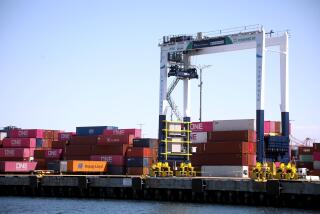Fuel-Cell Vehicles to Hit California Roads
- Share via
California will get dozens of new hydrogen-powered fuel-cell vehicles and a string of hydrogen filling stations to help spur Gov. Arnold Schwarzenegger’s “hydrogen highway” plan under a new grant program announced Tuesday by federal Energy Secretary Spencer Abraham.
The $350 million in federal grants, plus $220 million in private funding, will be divided among five automaker-energy partnerships nationwide in the five-year program.
Abraham is expected to reveal more details today about California’s role in a speech at the National Hydrogen Assn. conference in Hollywood.
But interviews with various program participants suggest that automakers will place more than 150 hydrogen-fueled vehicles into service nationwide over the five-year program, with the majority of them used in California.
The grants are part of the $1.2 billion the Bush administration has set aside to develop hydrogen-fueled vehicles and hydrogen filling stations in the next five years.
But many analysts say development of a hydrogen energy system will be a multi-decades project costing tens of billions of dollars. And critics claim that the difficulties in producing fuel-grade hydrogen make it less efficient and potentially more polluting than gasoline.
Michael Flynn, director of the Office for the Study of Automotive Transportation at the University of Michigan, says carmakers have used the Bush administration’s support of hydrogen technology as an excuse to avoid catching up with Japanese carmakers in hybrid car technology. “The way we are approaching hydrogen development has distracted Detroit.”
Ford Motor Co. and General Motors Corp. are introducing their first gasoline-electric-powered hybrid vehicles this year. Toyota Motor Corp. and Honda Motor Co. have been selling popular hybrid cars in the U.S. for four years. Hybrids combine internal combustion engines and electric motors to increase power and fuel economy. While cleaner than most standard gasoline- or diesel-fueled vehicles, hybrids still produce unhealthy emissions.
The federal hydrogen program outlined by Abraham in a speech at Wayne State University in Detroit is aimed at spurring development of “zero-emission” hydrogen-powered vehicles and of hydrogen fuel supplies to power the cars.
“The two go hand in glove,” said Andreas Schell, senior manager of fuel-cell systems for DaimlerChrysler. Schell said DaimlerChrysler would build and place as many as 30 fuel-cell vehicles for use in California and Michigan.
Essentially, a fuel-cell vehicle is an electric car or truck with an onboard generator, or fuel cell, that produces electricity by combining hydrogen and oxygen. Distilled water is the only byproduct, so the autos are considered emission-free. But they must carry a supply of hydrogen to function.
Carmakers and fuel companies say their goal is to produce hydrogen using renewable energy sources such as wind and solar power. But most of it now is produced from natural gas or other fossil fuels in a process that consumes tremendous amounts of electricity.
Ford said Tuesday that it would build 30 fuel-cell-powered Focus sedans to be used in the test program, 10 each in California, Michigan and Florida. The cars will be used by government agencies, universities and private firms.
Energy company BP, partnered with Ford and DaimlerChrysler, will develop hydrogen fueling and production stations in California, said Michael Jones, general manager of BP’s hydrogen program. He wouldn’t disclose how many stations would be built.
A consortium that includes BMW, Toyota, Honda and Nissan Motor Corp. and their energy partner, Air Products & Chemicals Inc., said it would build 24 hydrogen fueling stations in California and put 65 hydrogen-fueled cars on the road. The partnership led by Chevron-Texaco and Hyundai Motor Corp. said it would build as many as six hydrogen fueling stations in California and place 32 fuel-cell-powered Hyundai sport utility vehicles into service.
GM, the nation’s largest automaker, has been a leading proponent of fuel-cell development and plans “to be competitive with the other participants,” said Tim Vail, business development director for GM’s fuel-cell programs.






